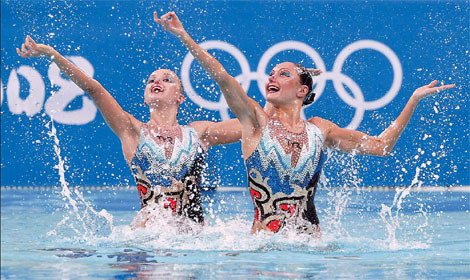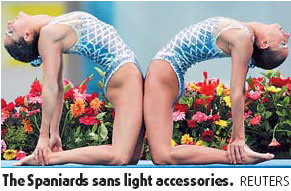In the face of their Russian foes' invincibility, Spanish synchronized swimmers apparently tried to give themselves a leg up by fortifying swimsuits with embedded lights to dazzle the Olympic judges.
The waterproof gadgets were reportedly banned from the Spaniards' routine as accessories, but they would probably not have made a dent anyway.

Anastasia Davydova and Anastasia Ermakova of Russia perform in the synchronized swimming duet final yesterday. They defended their Olympic gold medal. [Agencies]
|
That is because Russian pair Anastasia Davydova and Anastasia Ermakova put in an almost flawless routine at yesterday's synchronized swimming duet finals in the Water Cube to defend their Olympic gold medal in the sport.
Swimming to the classic Peer Gynt Suite of Norwegian composer Edvard Hagerup Grieg, the duo put on an ambitious and beautifully executed routine to score eight full marks and two 9.9 points. They carried a top score of 49.334 points from Monday's technical routine to total 99.251 points.
Spain's Gemma Mengual and Andrea Fuentes won the silver with 98.334 points, and Japanese duo Saho Harada and Emiko Suzuki took the bronze with 97.167 points.
Chinese twins Jiang Tingting and Jiang Wenwen finished fourth with 96.334 points.
The rankings were also a perfect repetition of the 2007 World Championships.

Davydova and Ermakova, both 25, attributed their brilliant performance to the close competition with their rivals.
"I should say thank you to our Spanish and Japanese colleagues. They were very fierce competition, especially the Spanish girls, who are really strong competitors," Davydova said. "When we were training, we never forgot for a single moment how strong our competition was."
Her partner agreed.
"When you have strong competitors like these, it makes you work harder. It makes you achieve things you never thought would ever be possible," Ermakova said
The two Anastasias, partners since 1998, have taken home the gold from every international competition of the event since 2002.
It all boiled down to hard work, they said.
"In Athens, it was the first ever Olympic Games. Your first gold medal is probably the highest point in your life," Davydova said.
"For the last four years, we trained harder, because when you have that status of being an Olympic champion each of our training session was difficult, not so much on the physical side, but in the mental aspect. Each time we were training, we were aware we had to show we could be Olympic gold medalists again."
The Spanish swimmers were also elated at winning for their country its first Olympic synchronized swimming medal. "Our coach said it was going to be a hard fight. We were very prepared," said 31-year-old veteran Mengual. "We obtained the best results, so we are extremely happy."
The 21-year-old Chinese twins were expected to win medals yesterday, but failed after making an error in the latter part of their routine and were beaten by their Japanese archrivals.
The two Jiangs beat the Japanese pair at the 2006 Doha Asian Games, but Harada and Suzuki got their revenge this time with better execution.
"We never dreamed of winning the medal so quickly. We always thought about what the Chinese had and what we didn't," Harada said. "We tried to be original and do our best."
"Of course there were regrets. We were aiming for a medal," said the Jiangs' Japanese coach, Masayo Imura. "But we still have the chance in the team event."
The team event starts today.
Agencies contributed to the story